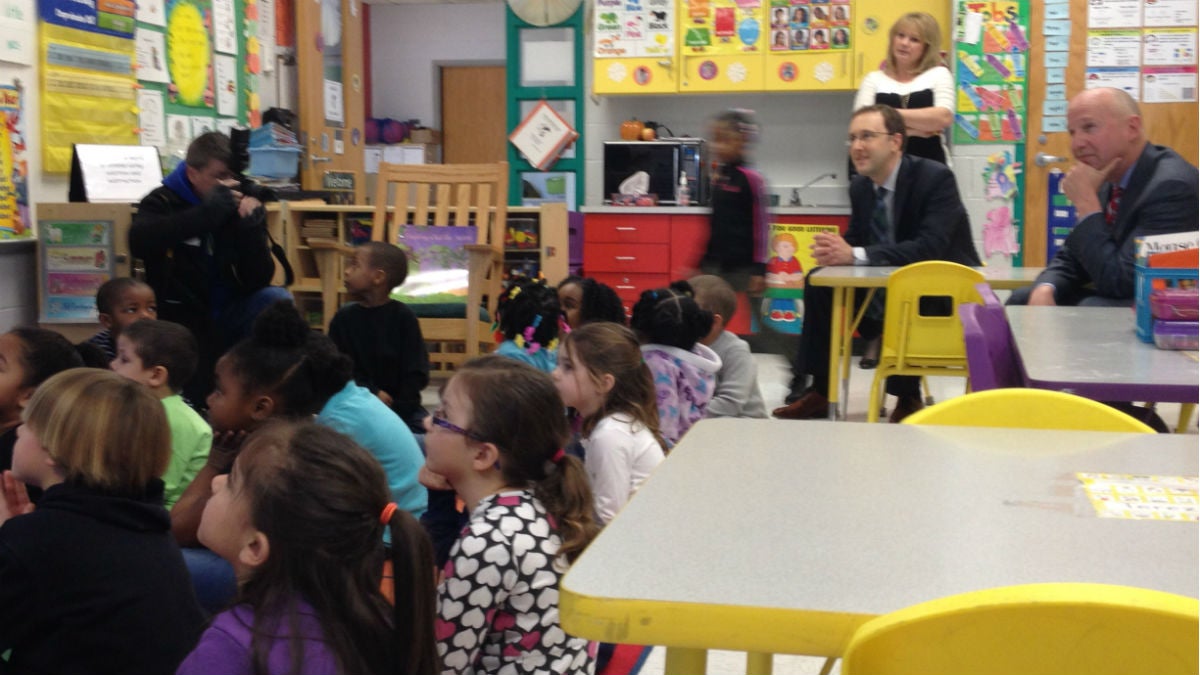Scale or scrap? Gov. Markell checks in on Delaware teacher training pilot

Governor Jack Markell (far right) and Secretary of Education Mark Murphy (second from right) enjoy a kindergarten math lesson at North Dover Elementary School. (Avi Wolfman-Arent, Newsworks/WHYY)
Governor Jack Markell toured an experimental teacher training program Wednesday armed with a question: Did this work?
“Is there a sufficient benefit to this that we should take it to scale,” Markell asked.
Secretary of Education Mark Murphy appeared along with him, and had a similar question.
“What are the barriers to scaling this,” Murphy said.
On Wedneday, “this” referred to a tiny pilot program where aspiring teachers at Wilmington University spend an entire school year as teachers-in-residence. That’s opposed to the usual, semester-long teaching internships.
But the broader question–“Can we scale this?”–figures to loom large among Delaware’s education decision makers in the coming year. With Race to the Top money dwindling, the state will have to make tough decisions about the programs and experiments it seeded with federal money.
Murphy admitted as much in a recent interview with Newsworks/WHYY.
“Let’s ask, as we move through the Race to the Top years, what is continuing to work? What is not working? What worked and doesn’t need to be continued,” Murphy said. “Those are the core questions that we are asking.”
An early glance into the state’s thinking could come as early as next week. The Delaware Department of Education will appear before the General Assembly’s Joint Finance Committee next Wednesday. Immediately afterward, the department is expected to testify before the House of Representatives’ education committee.
Lawmakers in both bodies are likely to ask about how the department spent $119 million in Race to the Top funds and what it wants to prioritize moving forward.
Among Race to the Top initiatives, the teacher residency program is a small one. Wilmington University received $230,000 over the last two years to revamp its teacher prep programs. Some of that money allowed the school to place teacher residents in three Delaware schools beginning last fall.
Students in the program pay regular tuition, do not receive any compensation, and can’t have outside jobs. They are treated, in essence, like regular teachers.
“It’s total immersion,” said Betty Wyatt-Dix, a residency supervisor at WIlmington University.” You are considered a staff member. You are considered a teacher.”
The students are paired with teacher mentors, who, in return, act as adjunct professors and receive a stiped from Wilmington University. The university also paid for swivel cameras and other technology to seed the pilot program.
The cost is not prohibitive, especially at its current scale, says Tyler Wells, Wilington University’s chair of the Office of Clinical Studies. But it will be tough to convince students they need more time in the classroom, especially if it comes at the expense of a part-time job.
“The barriers are not so much financial,” Wells said. “It’s a paradigm shift in how think about teacher preparation.”
The question facing the state is whether the pilot produces enough good to warrant further investment and possible expansion.
The residency program does combine two of the state’s educational emphases: clinical education and improved teacher prep. The state helped start a residency program for aspiring principals in 2011, and now wants to grow it. That program has also been buyoed by Race to the Top money.
On the teacher prep front, the state passed a 2013 law intended to improve teacher education in the state. Delaware wants local universities to screen applicants better coming in and do a better job tracking them in the real world so they can guage the effectiveness of their curricula.
It’s hard to say if any of this augurs well for the teachers-in-residence.
At the very least, the students, teachers, and administrators involved in the program got a chance to state their case Wednesday. All endorsed the idea with gusto.
Susan Bunting, superintendent of the Indian River School District, said the pilot program in her district had gone so smoothly “we hear nothing about. It just works.”
WHYY is your source for fact-based, in-depth journalism and information. As a nonprofit organization, we rely on financial support from readers like you. Please give today.


